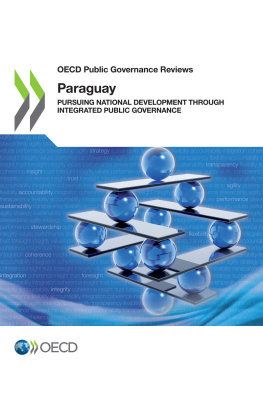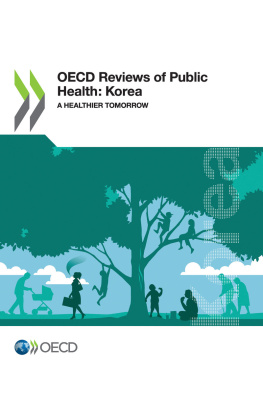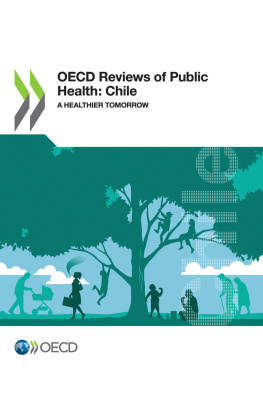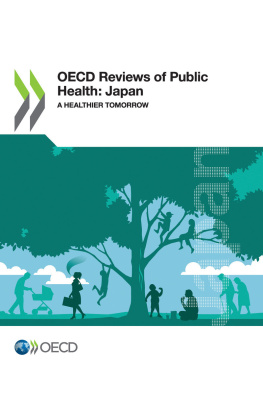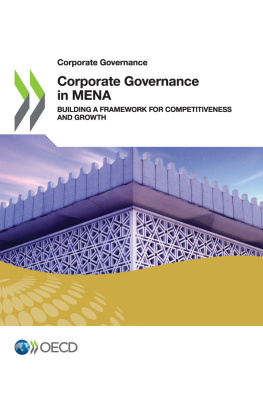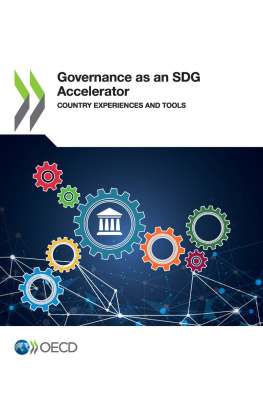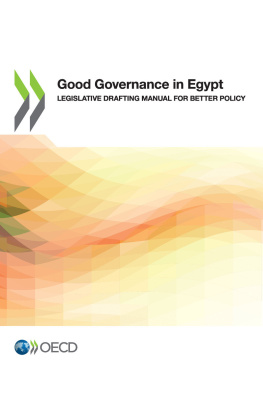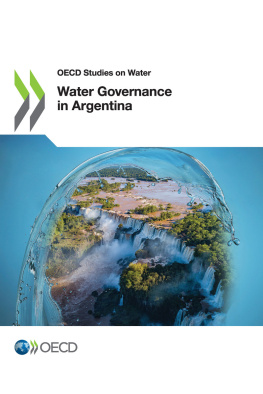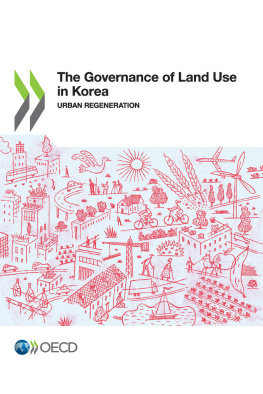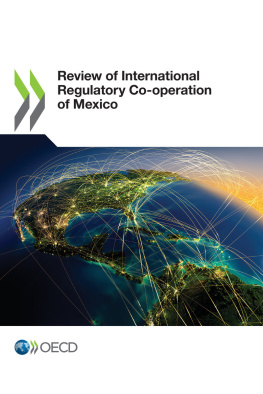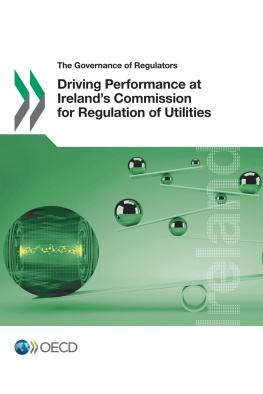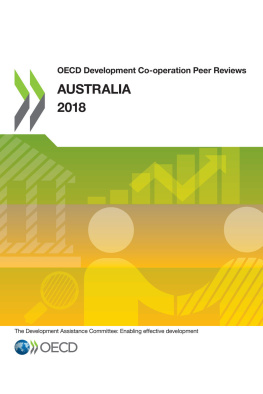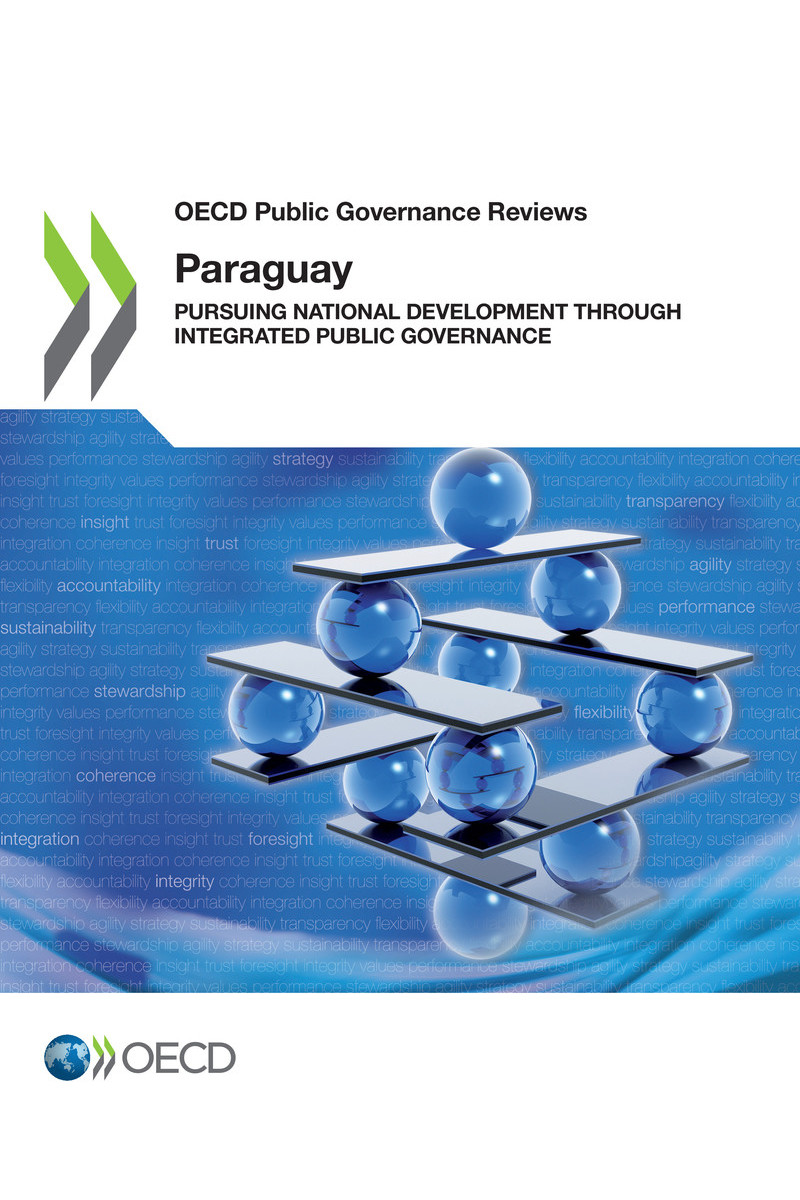OECD Public Governance Reviews: Paraguay Pursuing National Development through Integrated Public Governance
Please cite this publication as:
OECD (2018), OECD Public Governance Reviews: Paraguay: Pursuing National Development through Integrated Public Governance , OECD Publishing, Paris.
https://doi.org/10.1787/9789264301856-en
Metadata, Legal and Rights
ISBN: 978-92-64-30184-9 (print) - 978-92-64-30185-6 (pdf) - 978-92-64-30490-1 (HTML) - 978-92-64-30489-5 (epub)
DOI: https://doi.org/10.1787/9789264301856-en
Series: OECD Public Governance Reviews
ISSN: 2219-0406 (print) - 2219-0414 (online)
This work is published under the responsibility of the Secretary-General of the OECD. The opinions expressed and arguments employed herein do not necessarily reflect the official views of OECD member countries.
This document, as well as any data and any map included herein, are without prejudice to the status of or sovereignty over any territory, to the delimitation of international frontiers and boundaries and to the name of any territory, city or area.
The statistical data for Israel are supplied by and under the responsibility of the relevant Israeli authorities. The use of such data by the OECD is without prejudice to the status of the Golan Heights, East Jerusalem and Israeli settlements in the West Bank under the terms of international law.
Photo credits: Cover iStockphoto.com/Silense.
Corrigenda to OECD publications may be found on line at: www.oecd.org/publishing/corrigenda .
OECD 2018
You can copy, download or print OECD content for your own use, and you can include excerpts from OECD publications, databases and multimedia products in your own documents, presentations, blogs, websites and teaching materials, provided that suitable acknowledgement of OECD as source and copyright owner is given. All requests for public or commercial use and translation rights should be submitted to .
Foreword
Paraguay has become one of the most dynamic economies on the continent, with annual economic growth rates well above the OECD and Latin American averages. Thanks to a strong macroeconomic performance and to important structural reforms, many Paraguayans have overcome poverty and the size of the middle class has grown significantly.
Despite this important progress, the country remains highly unequal. Poverty is far from eradicated and more needs to be done to create well-paying, formal jobs for all Paraguayans throughout the country. The National Development Plan Paraguay 2030, adopted in 2014, provides the country with a long-term strategic development vision and clear policy objectives for reducing poverty, achieving inclusive economic growth and strategically integrating Paraguay into the international community. The National Development Plan recognises that addressing the most pressing socio-economic challenges requires an effective, efficient, strategic, open and transparent state. Paraguay now has the unique opportunity to consolidate past achievements and create a state that is capable of steering the countrys development and achieving its long-term strategic vision of a more inclusive and sustainable Paraguay for all Paraguayans.
The Government of Paraguay asked the OECD to conduct a Public Governance Review to obtain practical peer-driven advice and recommendations for tackling key public governance barriers to inclusive and sustainable growth. The OECD carried out this Review in close co-ordination with its Multi-Dimensional Review of Paraguay. The recommendations in this PGR should thus be read together with those in the Multi-Dimensional Country Review to obtain a more integrated, coherent picture of the reform advice being offered to Paraguay by the OECD.
This Public Governance Review advises Paraguay to pursue a comprehensive public governance reform agenda to enhance the capacity of its centre of government in the areas of policy co-ordination, strategic planning and monitoring and evaluation. This will, in turn, support more strategic whole-of-government decision making. The Review recognises that important efforts have been made to link strategic planning to budgeting, and recommends building on these efforts by strengthening the links between the multi-year planning system and Paraguays nascent results-based budgeting framework. The Review recommends that Paraguay develop and implement an integrated decentralisation strategy in order to address acute regional disparities and to make sure that all Paraguayans benefit from economic growth. It commends Paraguay on progress made in implementing human resources management reforms and advises on how to pursue the professionalization of a merit-based, professional civil service. Finally, the Review recognises that reforms have been undertaken to foster open government, including the adoption of legislation on access to information, and recommends that Paraguay pursue its ambitious agenda to move toward becoming a more open state.
This Review is one in a series of Public Governance Reviews carried out in member and partner countries, conducted under the auspices of the OECDs Public Governance Committee and managed by the Public Governance Directorate. The Directorates mission is to help governments design and implement strategic, evidence-based, innovative policies to strengthen public governance and open government; to respond more effectively to diverse and disruptive economic, social and environmental challenges; and deliver on governments commitments to citizens, all through better governance systems that can lead to sustainable, inclusive economic and social development. This Review was produced with the generous financial assistance of the European Union.
Note
The views expressed herein can in no way be taken to reflect the official opinion of the European Union.
Acknowledgements
This Public Governance Review was managed by Adam Knelman Ostry, Head of Unit/Senior Project Manager, Public Governance Reviews, and co-ordinated by David Michael Goessmann, Policy Analyst.
Chapter 1 on contextual factors affecting public governance reform in Paraguay was drafted by David Goessmann with input from Johannes Klein. Chapter 2 on centre-of-government co-ordination was drafted by Ivn Stola with input from Diego Millan and guidance from Adam Ostry. Chapter 3 on linking planning to budgeting was drafted by Ana Mara Ruiz with guidance from Ronnie Downes. Ivn Stola drafted Chapter 4 on multi-level governance with input from Paqui Santonja and Johannes Klein and guidance from Adam Ostry. Cristina Mendes drafted Chapter 5 on strategic human resources management with guidance from Daniel Gerson. David Goessmann drafted Chapter 6 on Open Government with guidance from Alessandro Bellantoni.
The Review team wish to thank the five Peer Reviewers who contributed their extensive country-based knowledge and experience to this Review:
Ms Ana Gabriel Ziga Aponte, Deputy Minister for Political Affairs and Citizen Dialogue, Presidency of the Republic of Costa Rica;
Mr Nuno Vitorino, a former senior public servant in the Ministry of State Reform and Public Administration and former president of the Commission for the Reform of the Central Administration, Republic of Portugal;

